
Democratic Party in Luxembourg — Demokratesch Partei (DP)
In this article, we will take a closer look at the Democratic Party of Luxembourg, analyzing its structure, leadership, current political stance on key issues and historical evolution.
For almost 70 years the Democratic Party has been one of the three main parties in the country and has ensured its presence at both local and European levels, with 12 seats in the Chamber of Deputies and 1 seat in the European Parliament. The current Prime Minister of Luxembourg – Xavier Bettel – was formerly president of the party before being elected in 2013.
Democratic party at a glance
The Democratic Party is one of the liberal forces in Luxembourg, promoting a belief in individual rights, free market principles, and limited government intervention in personal and economic matters. The Democratic Party (DP) in Luxembourg supports the middle class. Many civil servants, employees, independent workers, and high-income people vote for them.
It is one of the three largest political parties in the country: it currently holds 14 out of 60 seats in the Chamber of Deputies, Luxembourg's main legislative body. The number of seats a party holds can influence the policy direction and government formation.
Founded in 1955, this party is currently under the leadership of Lex Delles. Notably, Xavier Bettel, the former president of the DP and prime-minister of the county till 2023, solidifying the party's significance within the nation's political landscape. Within the Chamber of Deputies, the party ranks as the third-largest, further underlining its influence and importance in Luxembourg's political arena.
Political Guide

Structure and representativeness
The Democratic Party boasts a membership of approximately 6,200 individuals who, in conjunction with President Lex Delles and Secretary-General Carole Hartmann, serve as standard-bearers for the party's values and ideas.The DP's organizational structure encompasses local, regional, and national levels, providing members with platforms for engagement, discussion, and the submission of ideas aimed at advancing the nation.
The inner life of a party
At its core, the DP operates through a hierarchical framework comprising several committees



Electoral system divides the country into four constituencies. The number of seats allocated to each constituency is proportional to its population
People and influence in the party
Key personnel profiles
Prominent among the key figures associated with the Democratic Party is the former party president, Xavier Bettel, who has held the position of Prime Minister of Luxembourg since 2013 till 2023. Bettel's tenure as Prime Minister underscores the DP's significant presence and influence within the Luxembourgish government.
Leaders of the party






Other key members of the party
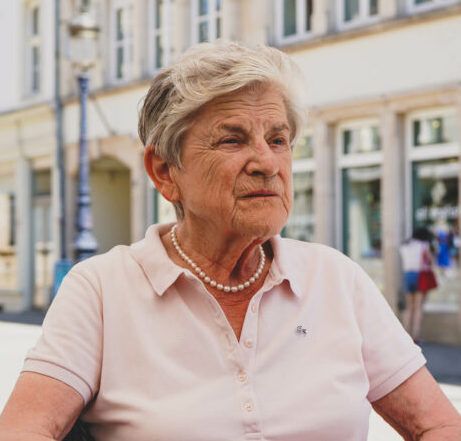
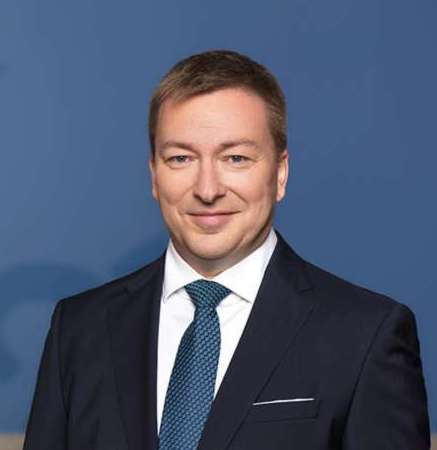

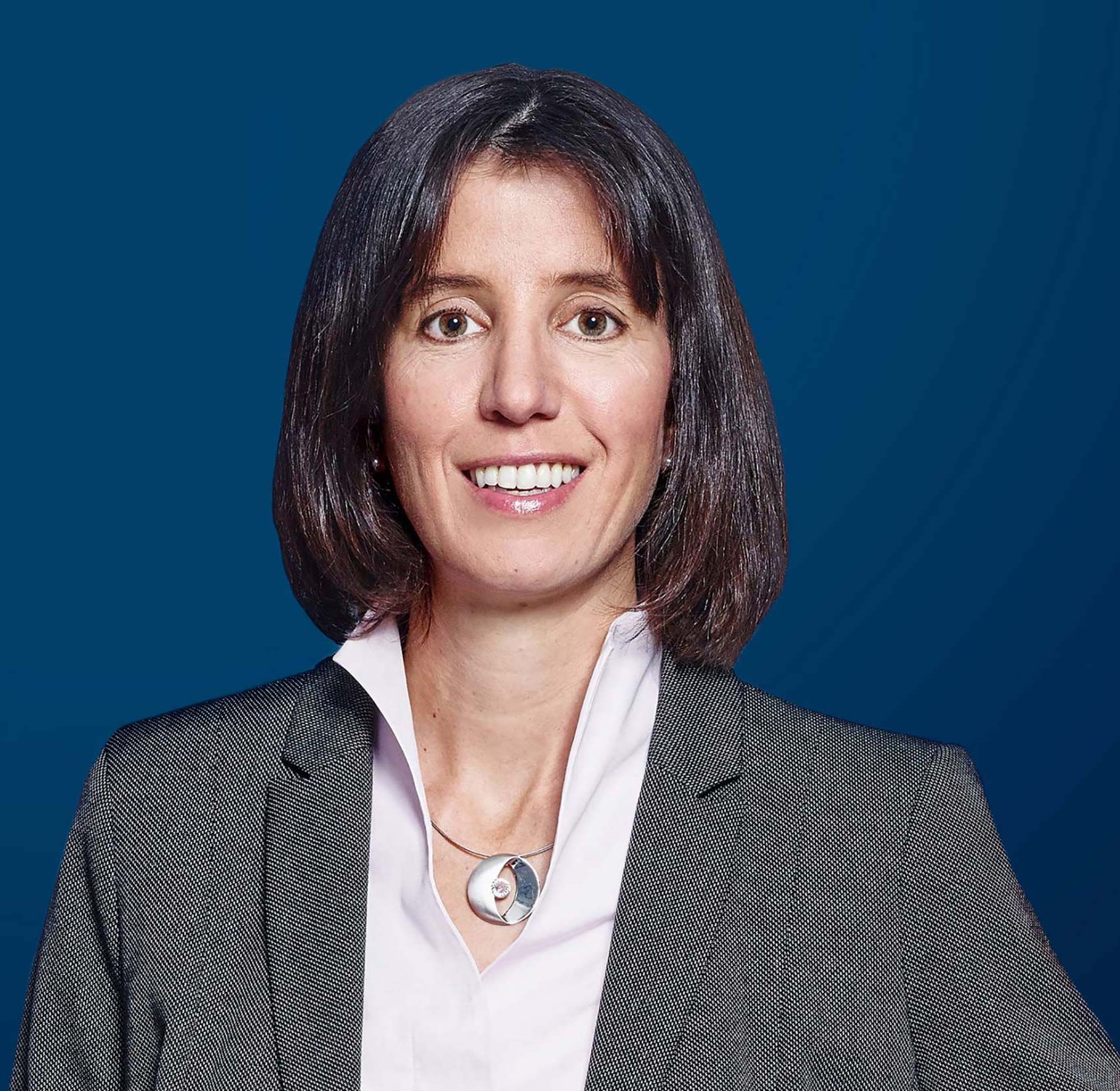
The DP is the third largest party in the Chamber of Deputies, behind the LSAP. In the 2023 legislative elections, the party secured 18.7% of the popular vote, solidifying its role as a major political force in the country. Previous elections in the country brought
Demokratesch Partei holds one of Luxembourg six seats in the European Parliament, further expanding its influence. In European Elections in 2024, they have secured one seat as well.
These seats are divided among member countries based on their population size.
DP's current political stance
The Democratic Party in Luxembourg is positioned in the middle of the political spectrum. It is often described as centrist because it tries to strike a balance between the left and right wings. The left tends to support social equality and communal values, while the right often emphasizes individual freedoms and traditional values.
The party and its cornerstones
It began in the late 1960s, when the Democratic Party underwent a strategic shift. Becoming more centrist has allowed them to work with both the Christian Social People's Party (CSV) on the right and the Luxembourg Socialist Workers' Party (LSAP) on the left. For the moment, they sit between these two parties.
Party views visualization
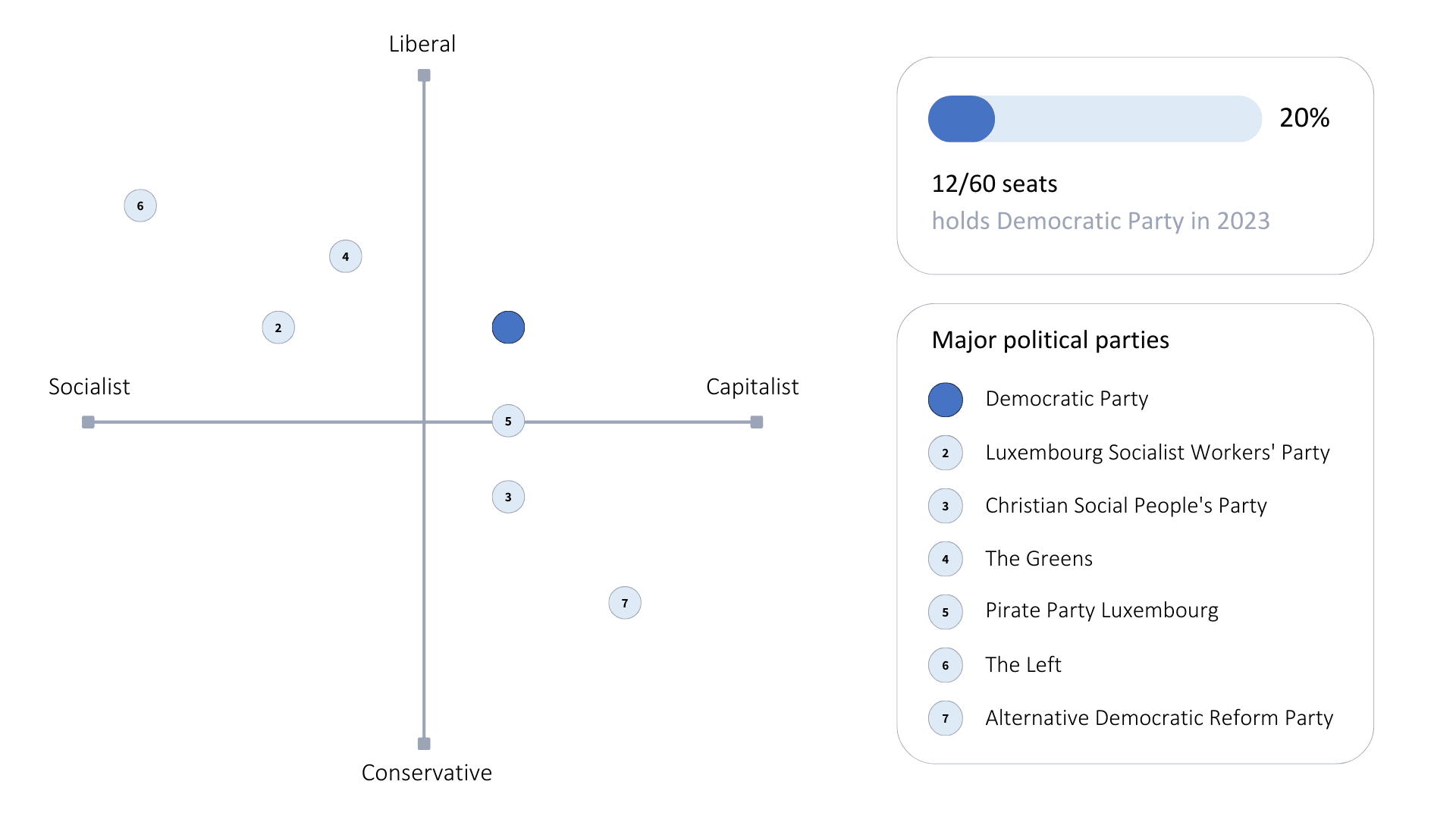
The DP has been a leading influence in getting other Luxembourg parties to think more globally. They did this by working in several important directions, both those that are specific to Europe and those that are global and important to all of mankind.
The DP is a strong supporter of European countries working closely together and holds the United Nations in high regard. A member of their party, Gaston Thorn, even had a leading role in the United Nations.
Political program
The Democratic Party (DP) of Luxembourg has outlined an extensive political program that addresses critical challenges and envisions a sustainable future for the nation.
You can see the complete program on the PD website, but for your convenience, we provide you a direct download link of the program and a condensed summary of their key priorities below.
The Luxembourg Democrats commit to tackling urgent societal challenges through sustainable investment programmes in areas such as
They emphasize immediate action, including the planning of major infrastructure projects – new schools and hospitals, new railway lines.
The DP aims to launch a historic public housing construction offensive in collaboration with private stakeholders. This initiative seeks to provide affordable rental housing for young professionals, expanding the public housing sector and offering targeted financial assistance.
Prioritizing a fair and less burdensome tax system and bolstering purchasing power remains at the core of the DP's agenda. They pay special attention to supporting families with children.
The party advocates for a high quality of life at all stages, including improved work-life balance. They promote quality education and flexible work models to grant individuals more time for family and leisure.
The DP is committed to ensuring long-term prosperity through responsible energy and climate policies, with a strong focus on human well-being. They actively engage society through the Citizen's Climate Office (Klimabiergerrot) to shape the national energy and climate plan. Massive investment and subsidies are planned to accelerate the energy transition, providing all citizens and businesses with safer and more affordable energy.
The Democratic party in Luxembourg works to create an attractive economic environment that not only creates new jobs, but also preserves the nation's wealth. Furthermore, the party recognizes the value of international talent and supports policies that welcome expats.
The democratic political party places a strong emphasis on building the future by investing heavily in several main domains
They believe these efforts are essential to securing prosperity, ensuring opportunities for future generations, and fostering individual fulfillment.
Party representation
The Democratic Party (DP) in Luxembourg has consistently advocated for the interests of the middle class, shaping its distinctive socio-economic profile. Throughout its tenure in government, the DP has consistently held the portfolio for the middle class, reflecting its commitment to representing this demographic.
Electorate demographics
This popularity helps them get more votes. Most of the supporters of the democratic party live in Luxembourg city and its wealthy neighboring areas.
Since 1970, the capital of Luxembourg — Luxembourg City — has always been governed by a mayor from the Democratic Party (DP). Currently, the experienced and dedicated Lydie Polfer holds the esteemed post, a position she has held since 2013, marking a significant period of stability and growth for the city. Polfer, a stalwart of the DP, has worked tirelessly to implement policies that reflect the party's liberal and progressive ideals, focusing on sustainable development, housing, and transportation improvements.

| DP | LSAP | CSV | Greens | |
| Environment | Middle | Low | Low | High |
| Electorate | Young | Older | Older | Young |
| Trade unions | No | Yes | Yes | Yes |
| Secularism | Yes | Yes | No | Yes |
Democratic party (DP) office is located in Luxembourg City
- Office location: 2A rue des Capucins, Luxembourg
- Phone number: (+352) 22 10 21
- Official website: DP.lu
Brief history of the party
The Democratic Party of Luxembourg has a rich history spanning several decades. It was established in 1955, evolving through various political landscapes.
Emergence as a major party: 1950s-1960s
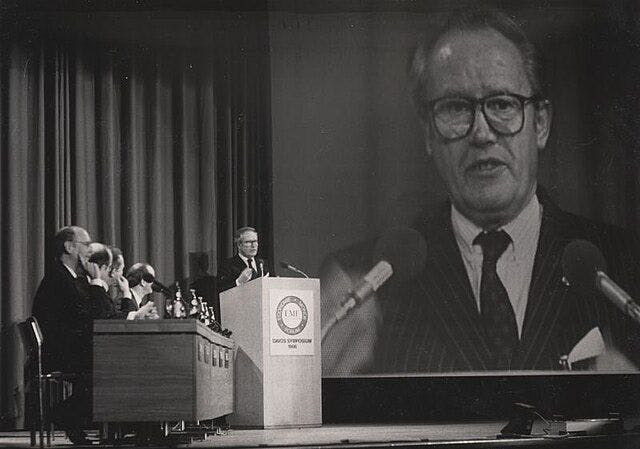
- The Democratic Party (DP) traces its history back to the founding of the Liberal League in 1904.
- The present-day party was established on April 24, 1955, succeeding the Democratic Group, which included liberal-oriented resistance fighters aiming to shape the political landscape.
- In 1959, the DP secured 11 seats in the Chamber of Deputies, briefly participating in a large coalition with the Christian Social People's Party (CSV) and the Luxembourg Socialist Workers' Party (LSAP).
- By 1964, the DP returned to six seats, but in 1968, it absorbed the Popular Independent Movement, experiencing a resurgence and gaining 11 seats. This allowed it to enter the government with the CSV under Prime Minister Pierre Werner.
Government and reforms: 1970s
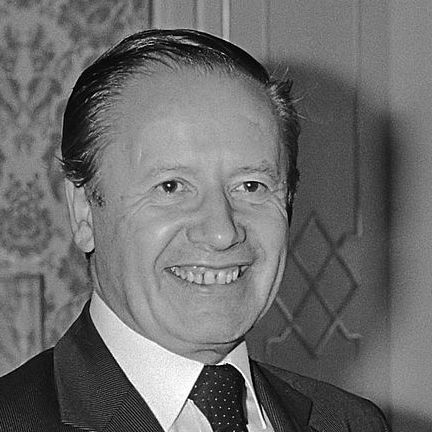
- The DP remained in coalition with the CSV until 1974, when it gained substantial support in the 1974 legislative elections, securing 22.2% of the votes and 14 seats. This shift led to coalition negotiations with the LSAP, resulting in the DP securing key ministerial positions, including Prime Minister Gaston Thorn.
- Despite economic challenges, the coalition implemented significant social reforms, including the abolition of the death penalty (1974), no-fault divorce (1975), and abortion legalization (1978). Plans for a nuclear power plant in Remerschen, supported by the DP, were abandoned in 1977.
Modern times and the Democratic party: 1980s-2023
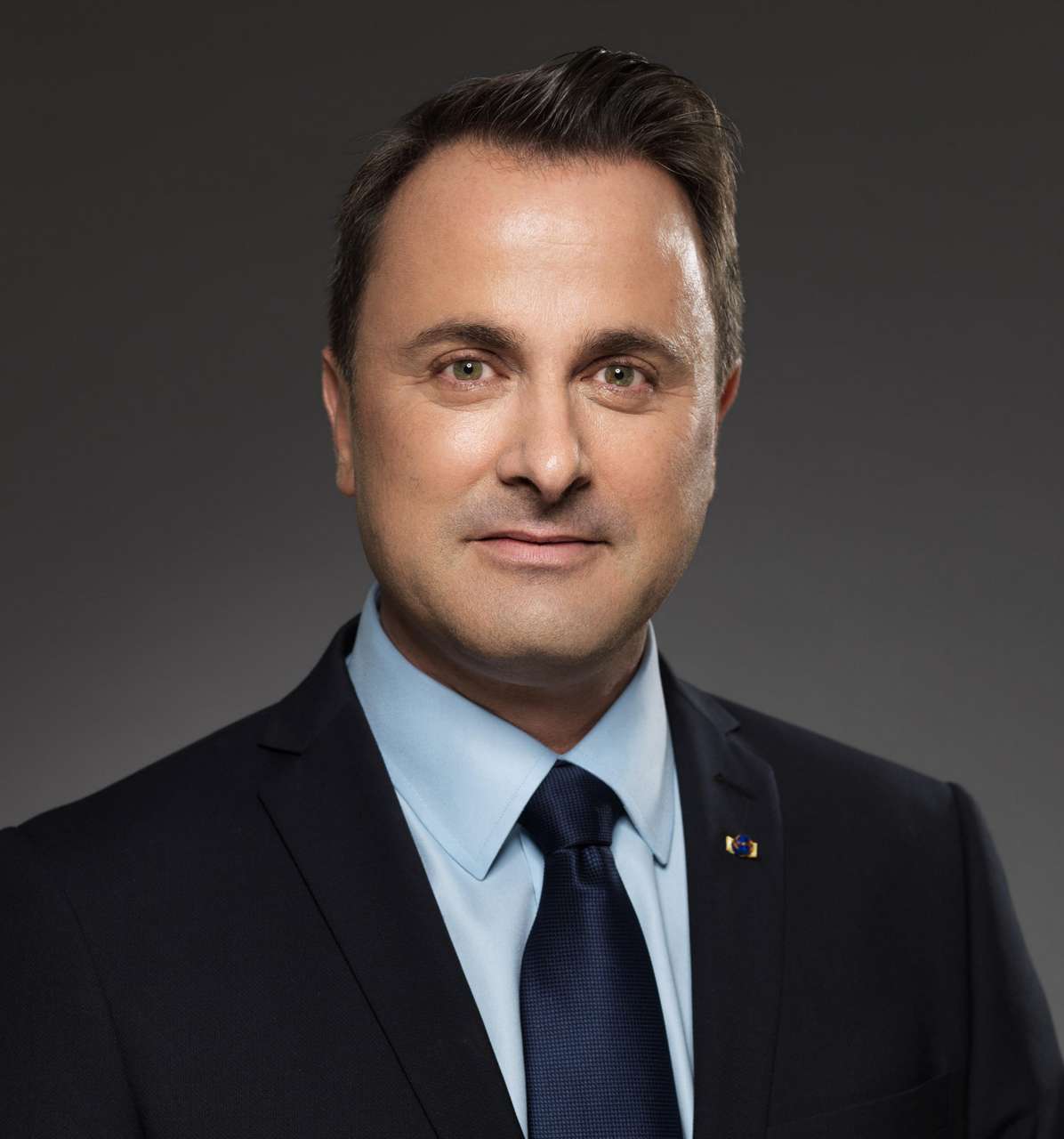
- In 1979, the DP with Gaston Thorn, and the LSAP's support, faced Werner in the elections, but the CSV won. In 1980, Gaston Thorn became President of the European Commission, and Colette Flesch replaced him as ministe
- The DP's fortunes waned in the 1984 legislative elections, losing one seat, and trailing the LSAP. The LSAP formed a coalition with the CSV.
- The DP remained in opposition until 1999 when it became the second-largest party in the Chamber of Deputies.
- After the 2013 legislative elections, the DP negotiated a three-party coalition with the LSAP and the Greens, with Xavier Bettel as Prime Minister.
Frequently Asked Questions (FAQ)
Who are the prominent leaders of the DP, both past and present?
Past leaders of the Democratic Party include notable figures like Gaston Thorn and Xavier Bettel, who served as Prime Ministers of Luxembourg. Presently, Lex Delles leads the party as its president, continuing a legacy of influential leadership within the DP.
How is the party positioned in the Luxembourg political spectrum?
The DP occupies a moderate center-right position within Luxembourg's political landscape. Over the years, it has strategically shifted towards the political center to facilitate coalitions with various parties, emphasizing civil liberties, human rights, and internationalism while adopting a more liberal economic stance.
What notable reforms or policies has the DP been involved in during its history?
The DP has played a pivotal role in enacting significant social reforms in Luxembourg, including the abolition of the death penalty (1974), the introduction of no-fault divorce (1975), and the legalization of abortion (1978). They have also been instrumental in advancing Luxembourg's international engagement, emphasizing European integration, environmental policies, and human rights advocacy. These reforms have shaped Luxembourg's modern political and social landscape.
Source: dp.lu, gouvernement.lu, fr.wikipedia.org
We took photos from these sources: DP website; Gouvernement.lu, author Yves Kortum; DP Facebook official page; Wikimedia